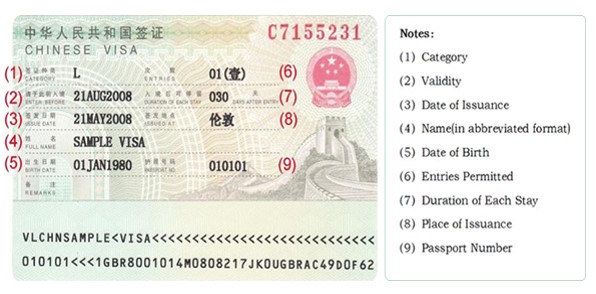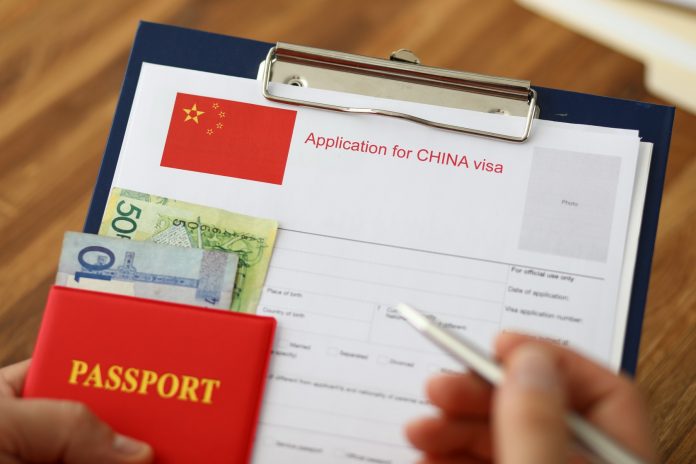A Brief Introduction to Chinese Visa

A visa is an officially approved document issued by authorized bodies for the government, in accordance with the laws of the country, to foreign citizens applying to enter, leave or transit through the country.
In line with international law and practice, any sovereign state is entitled to make its own decisions as to whether to allow a foreign citizen to enter or leave its borders, and to issue or refuse to issue a visa, or to revoke an issued visa according to its own laws.
Based on Chinese laws and regulations, Chinese consular officials may decide on the type of visa, number of entries, validity period and duration of stay, and may also refuse a visa application or revoke an issued visa.
- The necessity to apply for a Chinese visa if a foreign citizen is planning to visit China
Foreign citizens should have applied for and obtained appropriate visas before entering China unless they are visa-exempt according to certain agreements and regulations.
You are advised to ensure that your visa is valid before travel. If your visa has expired or the visa has insufficient number of entries, you need to apply for a new visa.
- China’s Visa Authorities are:
(1) Chinese diplomatic missions, consular posts, Office of the Commissioner of the Ministry of Foreign Affairs in the Hong Kong Special Administrative Region, Office of the Commissioner of the Ministry of Foreign Affairs in the Macao Special Administrative Region, and other resident organizations abroad authorized by the Ministry of Foreign Affairs are responsible for handling visa applications by foreign citizens for entry into and transit through Chinese mainland and the Hong Kong Special Administrative Region of China.
(2) The Ministry of Foreign Affairs and the local foreign affairs offices authorized by the Ministry of Foreign Affairs are responsible for issuance, change and extension of diplomatic and service visas and for issuance of residence permit to holders of diplomatic and service visas.
(3) The Ministry of Public Security and the local public security authorities authorized by the Ministry of Public Security are responsible for inspection on entry and exit of foreigners, issuance of visas at the port of entry, extension and change of ordinary visas, and issuance of residence permit to holders of ordinary visas, who are already in China.
(4) The Immigration Department of the Government of the Hong Kong Special Administrative Region is responsible for matters relating to foreigners’ entry into and exit from the Hong Kong Special Administrative Region. Its Website address: http://www.immd.gov.hk
(5) Macao Public Security Police Force Immigration Service. Unless visa exempted according to bilateral agreements, a foreigner may apply for a visa to enter Macao upon arrival at the Port of Entry. Website address of the Macao public security police force: http://www.fsm.gov.mo/psp/cht/main.html
- Types of Chinese visas
Chinese visas fall into the types of diplomatic visas, courtesy visas, public service visas and ordinary visas. Ordinary visas can be further classified as the following categories:
(1) C visa: Issued to foreign crew members of means of international transportation, including aircraft, trains and ships, or motor vehicle drivers engaged in cross-border transport activities, or to the accompanying family members of the crew members of the above-mentioned ships.
(2) D visa: Issued to those who intend to reside in China permanently.
(3) F visa: Issued to those who intend to go to China for exchanges, visits, study tours and other activities.
(4) G visa: Issued to those who intend to transit through China.
(5) J1 visa: Issued to resident foreign journalists of foreign news organizations stationed in China. The intended duration of stay in China exceeds 180 days.
(6) J2 visa: Issued to foreign journalists who intend to go to China for short-term news coverage. The intended duration of stay in China is no more than 180 days.
(7) L visa: Issued to those who intend to go to China as a tourist.
(8) M visas: Issued to those who intend to go to China for commercial and trade activities.
(9) Q1 visa: Issued to those who are family members of Chinese citizens or of foreigners with Chinese permanent residence and intend to go to China for family reunion, or to those who intend to go to China for the purpose of foster care. The intended duration of stay in China exceeds 180 days.
“Family members” refers to spouses, parents, sons, daughters, spouses of sons or daughters, brothers, sisters, grandparents, grandsons, granddaughters and parents-in-law.
(10) Q2 visa: Issued to those who intend to visit their relatives who are Chinese citizens residing in China or foreigners with permanent residence in China. The intended duration of stay in China is no more than 180 days.
(11) R visa: Issued to those who are high-level talents or whose skills are urgently needed in China.
(12) S1 visa: Issued to those who intend to go to China to visit the foreigners working or studying in China to whom they are spouses, parents, sons or daughters under the age of 18 or parents-in-law, or to those who intend to go to China for other private affairs. The intended duration of stay in China exceeds 180 days.
(13) S2 visa: Issued to those who intend to visit their family members who are foreigners working or studying in China, or to those who intend to go to China for other private matters. The intended duration of stay in China is no more than 180 days.
“Family members” refers to spouses, parents, sons, daughters, spouses of sons or daughters, brothers, sisters, grandparents, grandsons, granddaughters and parents-in-law.
(14) X1 visa: Issued to those who intend to study in China for a period of more than 180 days.
(15) X2 visa: Issued to those who intend to study in China for a period of no more than 180 days.
(16) Z visa: Issued to those who intend to work in China.
- Validity period, number of entries and duration of each stay of Chinese visa.
(1) The validity period of a visa (“Enter Before”) refers to the valid time length of the visa itself. A visa is valid for the visa holder to enter the Chinese border from the date the visa is issued to the expiry date (as of Beijing Time). If a visa has unused entries, the holder can still use it before the expiry date (inclusive).
(2) The term “Entries” of a visa refers to the number of times the visa holder is permitted to enter the Chinese border within the validity period of the visa. A visa becomes invalid if all the entries are used up or if the visa has expired even though there are entries unused.
In this case, you will have to submit a new visa application if you wish to visit China. Holders of an invalid visa will be refused entry to China at the border.
(3) The “Duration of Each Stay” refers to the maximum number of days a visa holder is permitted to stay in China after each entry, namely, the maximum number of days a visa holder can stay in China from the day of entry.
Foreign citizens who stay in China longer than permitted by the visa without applying for an extension of stay will be considered as violating the Law of the People’s Republic of China on Control of the Entry and Exit of Aliens and Rules Governing the Implementation of the Law of the PRC on the Entry and Exit of Aliens, and as a result will face prosecution of fines or other penalties. Therefore, the visa holder must apply for an extension of stay at local public security authorities above county level (detailed requirements are available on the websites of local public security authorities) should it be foreseeable that an overstay would happen. (However, approval of the application cannot be guaranteed.) Chinese embassies and consulates in foreign countries do not accept applications for visa extension.
Holder of D visa, J1 visa, Q1 visa, S1 visa, X1 visa, Z visa must register with local public security authorities for residential formalities within 30 days of entry. Resident members of diplomatic and consular missions must complete residential formalities at the Ministry of Foreign Affairs or local foreign affairs departments within 30 days of entry.
- Visa Exemptions
Foreign citizens visiting China are exempt from visas if one of the following situations is applicable to them.
(1) Direct Transit
Foreign citizens who are going to transit China are exempt from visas, as long as they have a booked seat in an international connecting flight, and their stay in the city of transit is not to exceed 24 hours, and they will not get out of the airport during the stay.
From the 1st January 2013, citizens of the following countries holding a valid travel document, a transit flight ticket with a confirmed departure seat and date leaving within 72 hours, who transit via Beijing (Beijing Capital International airport) or Shanghai (Shanghai Pudong International airport and Hongqiao International airport) to a third country (region) may be exempt from a transit visa, provided that their stay within the Beijing or Shanghai administrative regions does not exceed 72 hours: Austria, Belgium, Czech Republic, Denmark, Estonia, Finland, France, Germany, Greece, Hungary, Iceland, Italy, Latvia, Lithuania, Luxembourg, Malta, Netherlands, Poland, Portugal, Slovakia, Slovenia, Spain, Sweden, Switzerland, Russia, United Kingdom, Ireland, Cyprus, Bulgaria, Romania, Ukraine, Serbia, Croatia, Bosnia and Herzegovina, Montenegro, Macedonia, Albania, USA, Canada, Brazil, Mexico, Argentina, Chile, Australia, New Zealand, Republic of Korea, Japan, Singapore, Brunei, United Arab Emirates, and Qatar.
From the 1st August 2013, citizens of the following countries holding a valid travel document, a transit flight ticket with a confirmed departure seat and date leaving within 72 hours, who transit via Guangzhou Baiyun International airport to a third country (region) may be exempt from a transit visa, provided that their stay within the Guangdong administrative region does not exceed 72 hours: Austria, Belgium, Czech Republic, Denmark, Estonia, Finland, France, Germany, Greece, Hungary, Iceland, Italy, Latvia, Lithuania, Luxembourg, Malta, Netherlands, Poland, Portugal, Slovakia, Slovenia, Spain, Sweden, Switzerland, Russia, United Kingdom, Ireland, Cyprus, Bulgaria, Romania, Ukraine, Serbia, Croatia, Bosnia and Herzegovina, Montenegro, Macedonia, Albania, USA, Canada, Brazil, Mexico, Argentina, Chile, Australia, New Zealand, Republic of Korea, Japan, Singapore, Brunei, United Arab Emirates, and Qatar.
From the 1st September 2013, citizens of the following countries holding a valid travel document, a transit flight ticket with a confirmed departure seat and date leaving within 72 hours, who transit via Chengdu Shuangliu airport to a third country (region) may be exempt from a transit visa, provided that their stay within the Chengdu administrative region does not exceed 72 hours: Austria, Belgium, Czech Republic, Denmark, Estonia, Finland, France, Germany, Greece, Hungary, Iceland, Italy, Latvia, Lithuania, Luxembourg, Malta, Netherlands, Poland, Portugal, Slovakia, Slovenia, Spain, Sweden, Switzerland, Russia, United Kingdom, Ireland, Cyprus, Bulgaria, Romania, Ukraine, Serbia, Croatia, Bosnia and Herzegovina, Montenegro, Macedonia, Albania, USA, Canada, Brazil, Mexico, Argentina, Chile, Australia, New Zealand, Republic of Korea, Japan, Singapore, Brunei, United Arab Emirates, and Qatar.
(2) Travellers to the Pearl River Delta or Hainan Island
1) Foreign citizens holding ordinary passports of a country with diplomatic relations with China, are exempt from a visa, if they are already in Hong Kong or Macao, and wish to enter the Pearl River Delta region (including Guangzhou, Shenzhen, Zhuhai, Foshan, Dongguan, Zhongshan, Jiangmen, Zhaoqing and Huizhou) as a member of tourist group organised by a travel agency legally registered in Hong Kong and Macao, and also if their stay will not exceed 6 days.
2) Citizens of the following countries holding ordinary passports are exempt from a visa, if they travel to Hainan Province in a tourist group (more than five people inclusive) organised by an international travel agency registered in Hainan Province and approved by China National Tourism Administration, and also if their stay is not to exceed 15 days: the U.S., Malaysia, Thailand, Republic of Korea, the Philippines, Indonesia, Germany, the U.K., France, Austria, Italy, Russia, Switzerland, Sweden, Spain, Netherlands, Canada, Australia, New Zealand, Finland, Denmark, Norway, Ukraine, Kazakhstan, Japan, and Singapore. Among the listed countries, visitors from Republic of Korea, Germany or Russia may stay for 21 days if their group includes more than two persons inclusive.
3) Citizens of Singapore, Brunei and Japan
Citizens of Singapore, Brunei and Japan are exempt from a visa when entering the border via a port open to foreigners, if their visit to China is for the purpose of tourism, doing business, meeting relatives and friends, or transiting, and if their stay is not to exceed 15 days. However, a visa will be required if one of the following situations is applicable:
a. the passport held is an ordinary one and the stay is to exceed 15 days, and the purpose of the visit is tourism, business or meeting relatives and friends in China;
b. the passport held is an ordinary one, and the purpose of the visit is study, work, settlement, official visit or news coverage in China;
c. the visitor holds a Japanese diplomatic or a public service passport.
4) Holders of valid APEC business travel cards
An APEC business travel card is equivalent to a three-year visa with multiple-entries. Holder of such a card together with a matching passport is entitled to making multiple entries, to China during the validity period of the card, and the maximum length of each stay is not to exceed two months.
5) Holders of valid certificate of permanent residence issued to foreign citizens by the People’s Republic of China
6) Holders of valid residence permit issued to foreign citizens by Chinese public security authorities
Foreign citizens who come to China to pursue study or to take office or to take employment, and resident foreign journalists, must register with the public security authorities for a residence permit after arriving in China. Within the validity period of the residence permit foreign citizens may reside in China or make multiple entries into and exits from China without having to obtain another visa.
7) Bilateral Agreements
Citizens of some countries having bilateral agreements, either signed or reached with China, are exempt from a visa if they meet certain requirements. For further information please check the list of agreements on visa exemption signed between
http://english.www.gov.cn/services/visit_china/2014/08/23/content_281474982978372.htm
Tourist Group Visa
The Tourist Group Visa is issued to a tourist group – which comprises at least five members – aiming to travel to China.
Application – Issuing authorities
A.Chinese embassies or consulates
B.Port cities of China
Authorized port cities include: Beijing, Shanghai, Tianjin, Chongqing, Dalian, Fuzhou, Xiamen, Xi’ an, Guilin, Hangzhou, Kunming, Guangzhou (Baiyun), Shenzhen(Luohu, Shekou), Zhuhai (Gongbei), Haikou, Sanya, Ji’nan, Qingdao, Yantai, Weihai, Chengdu, Nanjing.
Documents required
- Invitation letter – original or faxed copy
- Group’s itinerary and schedule (including number of the group)
- Passports
- Names of the members of the group
Visit Group Visa
The Visit Group Visa is issued to an unofficial group – of at least nine members – who are visiting China for such purposes as performances, competitions and art exhibitions.
Documents required for application
- Invitation letter – original or faxed copy offered by authorized Chinese unit (including number of the authorized unit)
- Group’s itinerary
- Passports
- Names of the members of the group
Note: Nationals of a third country cannot apply for a group visa.
http://english.www.gov.cn/services/visit_china/2014/08/23/content_281474982976852.htm
Documents for visa application
Documents for visa application
Updated: Aug 4,2014 6:06 PM www.gov.cn

1. Basic Documents
(1) Passport
Original passport with at least six months of remaining validity and blank visa pages, and a photocopy of the passport’s data page and the photo page if it is separate.
(2) Visa Application Form and Photo
One completed Visa Application Form with a recently-taken color passport photo (bare-head, full face) against a light background attached.
(3) Proof of legal stay or residence status (applicable to those not applying for the visa in their country of citizenship)
If you are not applying for the visa in the country of your citizenship, you must provide the original and photocopy of your valid certificates or visa of stay, residence, employment or student status, or other valid certificates of legal staying provided by the relevant authorities of the country where you are currently staying.
(4) Photocopy of previous Chinese passports or previous Chinese visas (applicable to foreign citizens those who were Chinese citizens and have obtained foreign citizenship)
If you are applying for a Chinese visa for the first time, you should provide your previous Chinese passport held and a photocopy of its data page.
If you have obtained Chinese visas before and want to apply for a Chinese visa with a renewed foreign passport that does not contain any Chinese visa, you should present the photocopy of the previous passport’s data page and the photo page if it is separate, as well as the previous Chinese visa page. (If your name on the current passport differs from that on the previous one, you must provide an official document of name change.)
2. Supporting Documents
C-Visa
A letter of guarantee issued by a foreign transport company or an invitation letter issued by a relevant entity in China
D-Visa
The original and photocopy of the Confirmation Form for Foreigners Permanent Residence Status issued by the Ministry of Public Security of China.
We kindly remind you that:
Holders of D Visa shall, within 30 days from the date of their entry, apply to the exit/entry administrations of public security organs under local people’s governments at or above the county level in the proposed places of residence for foreigners’ residence permits.
F-Visa
An invitation letter issued by a relevant entity or individual in China. The invitation should contain:
(1) Information on the applicant (full name, gender, date of birth, etc.)
(2) Information on the planned visit (purpose of visit, arrival and departure dates, place(s) to be visited, relations between the applicant and the inviting entity or individual, financial source for expenditures)
(3) Information on the inviting entity or individual (name, contact telephone number, address, official stamp, signature of the legal representative or the inviting individual)
G-Visa
An onward air (train or ship) ticket with confirmed date and seat to the destination country or region.
J1-Visa
Visa Notification Letter issued by the Information Department of the Ministry of Foreign Affairs of China and an official letter issued by the media organization for which the journalist works.
Applicants should contact the press section of the Chinese Embassy/Consulate General in advance or and complete relevant formalities.
We kindly remind you that:
Holders of J1 Visa shall, within 30 days from the date of their entry, apply to the exit/entry administrations of public security organs under local people’s governments at or above the county level in the proposed places of residence for foreigners’ residence permits.
J2-Visa
Visa Notification Letter issued by the Information Department of the Ministry of Foreign Affairs of China or other authorized units in China and an official letter issued by the media organization for which the journalist works.
Applicants should contact the press section of the Chinese Embassy/Consulate General in advance and complete the required formalities.
L-Visa
Documents showing the itinerary including air ticket booking record (round trip) and proof of a hotel reservation, etc. or an invitation letter issued by a relevant entity or individual in China. The invitation letter should contain:
(1) Information on the applicant (full name, gender, date of birth, etc.)
(2) Information on the planned visit (arrival and departure dates, place(s) to be visited, etc.)
(3) Information on the inviting entity or individual (name, contact telephone number, address, official stamp, signature of the legal representative or the inviting individual)
M-Visa
(1) Documents on the commercial activity issued by a trade partner in China, or trade fair invitation or other invitation letters issued by relevant entity or individual. The invitation letter should contain:
a) Information on the applicant (full name, gender, date of birth, etc.)
b) Information on the planned visit (purpose of visit, arrival and departure dates, place(s) to be visited, relations between the applicant and the inviting entity or individual, financial source for expenditures)
c) Information on the inviting entity or individual (name, contact telephone number, address, official stamp, signature of the legal representative or the inviting individual)
Q1-Visa
For family reunion, the following documents are required:
(1) An invitation letter issued by a Chinese citizen or a foreign citizen with a Chinese permanent residence permit who lives in China. The invitation letter should contain:
a) Information on the applicant (full name, gender, date of birth, etc.)
b) Information on the visit ( purpose of visit, intended arrival date, place(s) of intended residence, intended duration of residence, arrival and departure dates, relations between the applicant and the inviting entity or individual, financial source for expenditures)
c) Information on the inviting individual (name, contact telephone number, address, official stamp, signature of legal representative or the inviting individual, etc.)
(2) Photocopy of Chinese ID of the inviting individual or foreign passport and permanent residence permit.
(3) Original and photocopy of certification (marriage certificate, birth certificate, certification of kinship issued by Public Security Bureau or notarized certification of kinship) showing the relationship of family members between applicant and inviting individual.
”Family members” refers to spouses, parents, sons, daughters, spouses of sons or daughters, brothers, sisters, grandparents, grandsons, granddaughters and parents-in-law.
For foster care, the following documents are required:
(1)Foster entrustment notarization issued by Chinese Embassies/Consulates General in foreign countries or Foster Care Power of Attorney notarized and authenticated in the country of residence or in China
(2)Original and photocopy of the consignor’s passport(s), as well as the original and photocopy of certification (marriage certificate, birth certificate, certification of kinship issued by Public Security Bureau or notarized certification of kinship) notarized and authenticated certification showing the relationship between parents or guardians and children.
(3) A letter of consent on foster care issued by the trustee living in China who has agreed to provide foster care services and a photocopy of the ID of the trustee.
(4) A photocopy of the certificate indicating the permanent residence status abroad of the parent(s) when the child was born, provided that either or both parents of the child are Chinese citizens.
We kindly remind you that:
Holders of Q1 Visa shall, within 30 days from the date of their entry, apply to the exit/entry administrations of public security organs under local people’s governments at or above the county level in the proposed places of residence for foreigners’ residence permits.
Q2-Visa
(1) An invitation letter issued by a Chinese citizen or a foreign citizen with a Chinese permanent residence permit who lives in China. The invitation letter should contain:
a) Information on the applicant (full name, gender, date of birth, etc.)
b) Information on the visit (purpose of visit, arrival and departure dates, place(s) to be visited, relations between the applicant and the inviting individual, financial source for expenditures)
c) Information on the inviting individual (name, contact number, address, signature etc.)
(2) Photocopy of Chinese ID or foreign passport and permanent residence permit of the inviting individual
R-Visa
The applicant should submit relevant certification in accordance with relevant regulations, and meet the relevant requirements of the competent authorities of the Chinese government on high-level talents and individuals with special skills urgently needed by China,
S1-Visa
(1) An invitation letter from the inviting individual (a foreigner who stays or resides in China for work or studies) which contains:
a) Information on the applicant (full name, gender, date of birth, etc.)
b) Information on the visit (purpose of visit, arrival and departure dates, place of intended residence, relations between the applicant and the inviting individual, financial source for expenditures, etc.)
c) Information on the inviting individual (name, contact telephone number, address, signature, etc.)
(2) A photocopy of the inviting individual’s passport and residence permit
(3)Original and photocopy of certification (marriage certificate, birth certificate, certification of kinship issued by Public Security Bureau or notarized certification of kinship) showing the relationship of immediate family members between applicants and inviting individual.
”Immediate family members” refers to spouses, parents, sons or daughters under the age of 18, parents-in-law.
We kindly remind you that:
Holders of S1 Visa shall, within 30 days from the date of their entry, apply to the exit/entry administrations of public security organs under local people’s governments at or above the county level in the proposed places of residence for foreigners’ residence permits.
S2-Visa
For visiting family members for a short period, the following documents are required:
(1)An invitation letter issued by the inviting individual (a foreigner who stays or resides in China for work or studies) which contains:
a) Information on the applicant (full name, gender, date of birth, etc.)
b) Information on the visit (purpose of visit, arrival and departure dates, place(s) to be visited, relations between the applicant and the inviting individual, financial source for expenditures, etc.)
c) Information on the inviting individual (name, contact telephone number, address, signature, etc.)
(2) A photocopy of the inviting individual’s (a foreigner who stays or lives in China for work or studies) passport and residence permit
(3) Photocopy of certification (marriage certificate, birth certificate or notarized certification of kinship) showing the relationship of family members between the applicant and the inviting individual.
”Family members” refers to spouses, parents, sons, daughters, spouses of sons or daughters, brothers, sisters, grandparents, grandsons, granddaughters and parents-in-law.
For private affairs, documentation identifying the nature of the private affairs should be provided as required by the consular officer.
X1-Visa
(1) Original and photocopy of the Admission Letter issued by a school or other entities in China.
(2) Original and photocopy of “Visa Application for Study in China” (Form JW201 or Form JW202).
We kindly remind you that:
Holders of X1 Visa shall, within 30 days from the date of their entry, apply to the exit/entry administrations of public security organs under local people’s governments at or above the county level in the proposed places of residence for foreigners’ residence permits.
X2-Visa
Original and photocopy of Admission Notice issued by a school or other entities in China.
Z-Visa
One of the following documents:
(1) Foreigners Employment Permit of the People’s Republic of China issued by Chinese government authorities for Human Resources and Social Security, as well as Invitation Letter of Duly Authorized Entity or Confirmation Letter of Invitation issued by relevant Chinese entities.
(2) Permit for Foreign Experts Working in China issued by the State Bureau of Foreign Experts as well as Invitation Letter of Duly Authorized Entity or Confirmation Letter of Invitation issued by relevant Chinese entities.
(3) Registration Certificate of Resident Representative Offices of enterprises of foreign countries(regions) issued by Chinese authorities of industrial and commercial administration, as well as Invitation Letter of Duly Authorized Entity or Confirmation Letter of Invitation issued by relevant Chinese entities as well as Invitation Letter of Duly Authorized Entity or Confirmation Letter of Invitation issued by relevant Chinese entities.
(4) An approval document for commercial performances issued by the Chinese government authorities for cultural affairs or Invitation Letter of Duly Authorized Entity or Confirmation Letter of Invitation issued by relevant Foreign Affairs Office of provincial governments of China.
(5)Letter of Invitation to Foreigners for Offshore Petroleum Operations in China issued by China National Offshore Oil Corporation;
We kindly remind you that:
Holders of Z Visa shall, within 30 days from the date of their entry, apply to the exit/entry administrations of public security organs under local people’s governments at or above the county level in the proposed places of residence for foreigners’ residence permits.
Special Reminder
(1) The invitation letter may be in the form of fax, photocopy or computer printout, but the consular officer may require the applicant to submit the original of the invitation letter.
(2) If necessary, the consular officer may require the applicant to provide other proof documents or supplementary materials, or require an interview with the applicant.
(3) The consular officer will decide on whether or not to issue the visa and on its validity, duration of stay and number of entries in light of specific conditions of the applicant.
(4) For further details, please visit the website of the relevant Chinese Embassy or Consulate General.
3. How to apply
(1) Applicants for diplomatic visas, public service visas, courtesy visas or visas/entry permits to Hong Kong need to approach the Chinese Embassy or the Chinese Consulate General in your consular service area. Appointments are not required. Postal applications are not accepted.
(2) Applicants for ordinary visas may submit their applications at the Chinese Visa Application Service Centre. (Details are available at the website:www.visaforchina.org). Appointment should be made online in advance before applications are submitted. The Chinese Visa Application Service Centre accepts postal applications.
(3) Some applicants may be required to attend an interview or to verify the signatures on the application documents at the Chinese Embassy or the Chinese Consulate General, if necessary.
http://english.www.gov.cn/services/visit_china/2014/08/23/content_281474982978386.htm






















